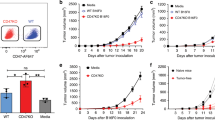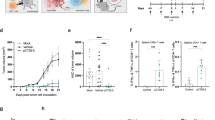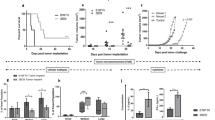Abstract
One obstacle in treating pre-existing parental tumors by vaccination with cytokine gene-modified tumor cells is the impaired expression of immune-related molecules such as MHC class I. In this study, to enhance MHC class I expression on pre-inoculated parental tumors, low dose TNF (300 U, 500 U, 1000 U), that is, TNF at levels shown to cause neither tumor regression nor any severe adverse reaction, was systemically injected into parental tumors bearing mice before vaccination with TNF gene-modified Meth-A cells or B-16 cells. Since the class I expression was confirmed to continue for at least 24 h following administration of TNF, TNF was administered 6 h before vaccination. Complete regression of relatively large parental tumors (M0) (8.0–10.0 mm in diameter) was observed in five of eight mice treated with 1000 U TNF, partial regression was observed in mice treated with 500 U, and a lesser yet significant regression was observed in mice treated with only 300 U. Contrarily, in the mice which had received vaccination without the TNF pretreatment, no complete regression was observed. This effect was inhibited with the anti-class I antibody or anti-CD8 antibody. Growth of a re-established, B16 tumor was significantly suppressed with a combination of TNF preadministration and vaccination of TNF gene-modified B16. These results indicate that pre-administration of low-dose TNF may be promising for enhancing vaccination effects of TNF gene-modified tumor cells.
This is a preview of subscription content, access via your institution
Access options
Subscribe to this journal
Receive 12 print issues and online access
$259.00 per year
only $21.58 per issue
Buy this article
- Purchase on Springer Link
- Instant access to full article PDF
Prices may be subject to local taxes which are calculated during checkout










Similar content being viewed by others
References
Asher AL et al. Murine tumor cells transduced with the gene for tumor necrosis factor-alpha. Evidence for paracrine immune effects of tumor necrosis factor against tumors J Immunol 1991 146: 3227–3234
Fujii S et al. Augmented systemic immunity in mice implanted with tumor necrosis factor-alpha gene-transduced Meth-A-cells Jpn J Cancer Res 1994 85: 315–324
Koshita Y et al. Effect of TNF-α gene-transduced tumor cells in treatment of established in vivo tumor Int J Cancer 1995 63: 130–135
Sato Y et al. Augmented antitumor effects of killer cells induced by tumor necrosis factor gene-transduced autologous tumor cells from gastrointestinal cancer patients Hum Gene Ther 1996 7: 1895–1905
Watanabe Y et al. Exogenous expression of mouse interferon cDNA in mouse neuroblastoma C1300 cells results in reduced tumorigenecity by augmented anti-tumor immunity Proc Natl Acad Sci USA 1989 86: 9456–9460
Cavallo F et al. Protective and curative potential of vaccination with interleukin-2-gene-transfected cells from a spontaneous mouse mammary adenocarcinoma Cancer Res 1993 21: 5067–5070
Dranoff G et al. Vaccination with irradiated tumor cells engineered to secrete murine granulocyte–macrophage colony-stimulating factor stimulates potent, specific, and long-lasting anti-tumor immunity Proc Natl Acad Sci USA 1993 90: 3539–3543
Tsioulias G et al. Loss of colonic HLA antigenes in familial adenomatous polyposis Cancer Res 1992 52: 3449–3452
Jager E et al. Immunoselection in vivo: independent loss of MHC class I and melanocyte differentiation antigen expression in metastatic melanoma Int J Cancer 1997 71: 142–147
Maccalli C et al. TCR β-chain variable region-driven selection and massive expansion of HLA-class I-restricted antitumor CTL lines from HLA 0201 melanoma patients J Immunol 1997 158: 5902–5913
Lindahl P, Leary P, Gresser I . Enhancement by interferon of the expression of surface antigens on murine leukemia L 1210 cells Proc Natl Acad Sci USA 1973 70: 2785–2788
Pfizenmaier K et al. Tumor necrosis factor enhances HLA-A, B, C and HLA-DR gene expression in human tumor cells J Immunol 1987 138: 975–980
Rothlein R et al. Induction of intercellular adhesion molecule 1 on primary and continuous cell lines by pro-inflammatory cytokines. Regulation by pharmacologic agents and neutralizing antibodies J Immunol 1988 141: 1665–1669
Vanky F et al. Expression of the adhesion molecule ICAM-1 and major histocompatibility complex class I antigens on human tumor cells is required for their interaction with autologous lymphocytes in vitro Cancer Immunol Immunother 1990 31: 19–27
Kuppner MC, van Meir E, Hamou MF, de Tribolet N . Cytokine regulation of intercellular adhesion molecule-1 (ICAM-1) expression on human glioblastoma cells Clin Exp Immunol 1990 81: 142–148
Beniers AJ et al. HLA-class-I and -class-II expression on renal tumor xenografts and the relation to sensitivity for alpha-IFN, gamma-IFN and TNF Int J Cancer 1991 48: 709–716
Suzuki S et al. Exogenous recombinant human IL-12 augments MHC class I antigen expression on human cancer cells in vitro Tohoku J Exp Med 1998 185: 223–226
Boehm U, Klamp T, Groot M, Howard JC . Cellular responses to interferon-gamma Ann Rev Immunol 1997 15: 749–795
Tsutsumi Y et al. Molecular design of hybrid tumor necrosis factor α with polyethylene glycol increases its anti-tumor potency Br J Cancer 1995 71: 963–968
Kuroda K et al. Novel muteins of human tumor necrosis factor with potent antitumor activity and less lethal toxicity in mice Int J Cancer 1995 63: 152–157
Kaneda Y et al. Antitumor activity of tumor necrosis factor α conjugated with divinyl ether and maleic anhydride copolymer on solid tumors in mice Cancer Res 1998 58: 290–295
Bartholeyns J, Freudenberg M, Galanos C . Growing tumor induce hypersensitivity to endotoxin and tumor necrosis factor Infect Immun 1987 55: 2230–2233
Moritz T et al. Phase I study of recombinant human tumor necrosis factor alpha in advanced malignant disease Cancer Immunol Immunother 1989 29: 144–150
Gamm H et al. Phase I trial of recombinant human tumor necrosis factor alpha in patients with advanced malignancy Eur J Cancer 1991 27: 856–863
Lattime EC, Stutman O . Tumor growth in vivo selects for resistance to tumor necrosis factor J Immunol 1989 143: 4317–4323
Robinet E et al. Evidence for tumor necrosis factor-α involvement in the optimal induction of class I allospecific cytotoxic T cells J Immunol 1990 144: 4555–4561
Bristol JA, Schlom J, Abrams SI . Development of a murine mutant ras CD8+ CTL peptide epitope variant that possesses enhanced MHC class I binding and immunogenic properties J Immunol 1998 160: 2433–2441
Kuppner MC, van Meir E, Hamou MF, de Tribolet N . Cytokine regulation of intercellular adhesion molecule-1 (ICAM-1) expression on human glioblastoma cells Clin Exp Immunol 1990 81: 142–148
Ranheim EA, Kipps TJ . Tumor necrosis factor-alpha facilitates induction of CD80 (B7–1) and CD54 on human B cells by activated T cells: complex regulation by IL-4, IL-10, and CD40L Cell Immunol 1995 161: 226–235
Itoh Y et al. Characterization of tumor necrosis factor gene-transduced tumor-infiltrating lymphocytes from ascitic fluid of cancer patients analysis of cytolytic activity Cancer Immunol Immunother 1995 40: 95–102
Itoh Y et al. Human tumor-infiltrating lymphocytes transfected with tumor necrosis factor gene could augment cytotoxicity to autologous tumor cells Jpn J Cancer Res 1991 82: 1203–1206
Acknowledgements
We thank Kevin S Litton for his help in manuscript preparation.
Author information
Authors and Affiliations
Rights and permissions
About this article
Cite this article
Lu, Y., Yamauchi, N., Koshita, Y. et al. Administration of subtumor regression dosage of TNF-α to mice with pre-existing parental tumors augments the vaccination effect of TNF gene-modified tumor through the induction of MHC class I molecule. Gene Ther 8, 499–507 (2001). https://doi.org/10.1038/sj.gt.3301429
Received:
Accepted:
Published:
Issue Date:
DOI: https://doi.org/10.1038/sj.gt.3301429
Keywords
This article is cited by
-
Translation of the radio- and chemo-inducible TNFerade vector to the treatment of human cancers
Cancer Gene Therapy (2009)
-
Combinational adenovirus-mediated gene therapy and dendritic cell vaccine in combating well-established tumors
Cell Research (2006)
-
In vitro and in vivo study of the antitumor effects of a THANK modified hepatoma cell line
The Chinese-German Journal of Clinical Oncology (2002)



